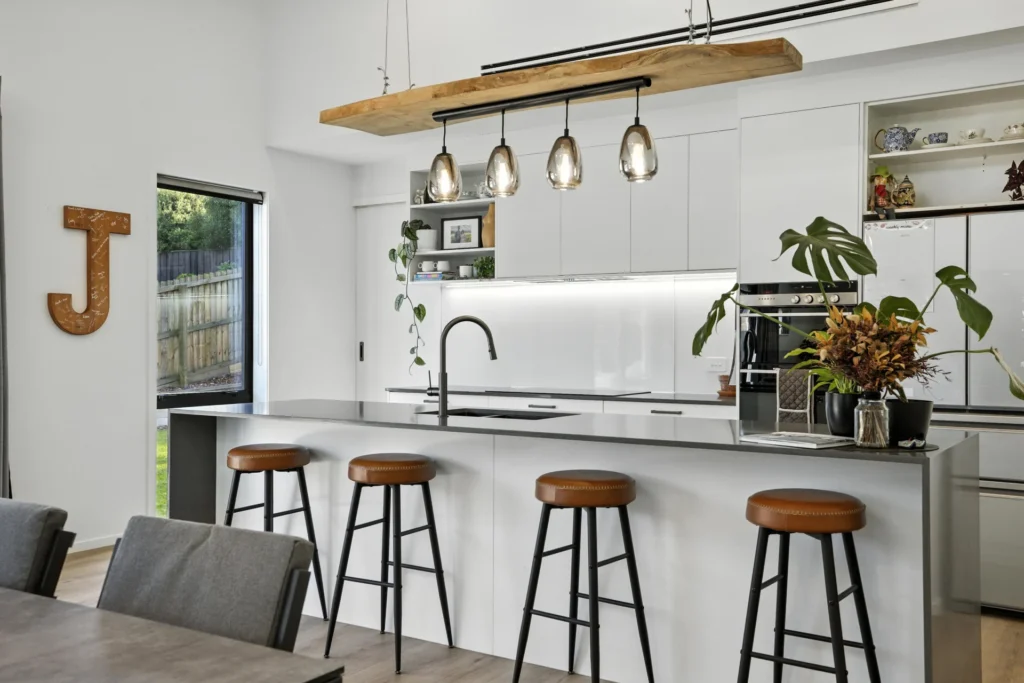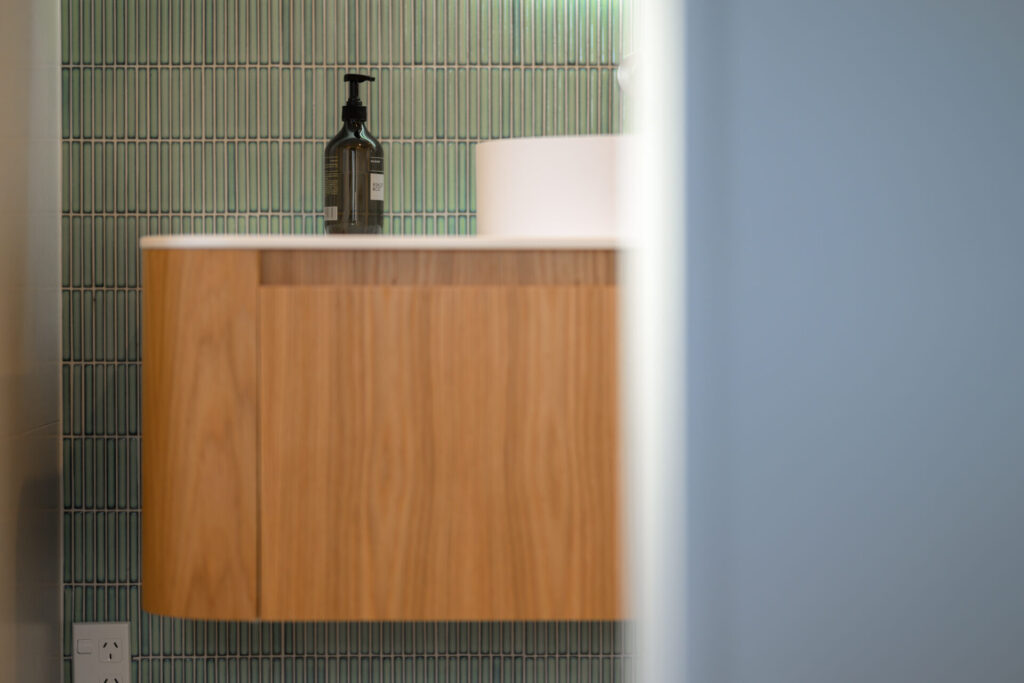Welcome to your complete guide on kitchen renovation costs in Christchurch. Whether you’re upgrading a tired space or planning your first remodel, knowing what to expect financially can save you from unwanted surprises. Renovation costs can vary widely depending on your kitchen size, the materials you choose, and the complexity of the work involved. In this guide, you’ll find real cost breakdowns, insights on what drives pricing up or down, and tips to help you budget smarter. If you’re starting from scratch or just gathering ideas, this post will help you make informed, confident decisions before you commit to any project.
The average kitchen renovation cost in Christchurch ranges from $15,000 to $45,000+, depending on the size, materials, and complexity of the project. A basic update may cost around $15,000–$25,000, while mid-range renovations fall between $25,000–$35,000. High-end kitchen remodels with custom features and premium finishes can exceed $45,000. Costs include cabinetry, benchtops, appliances, labour, and design changes.
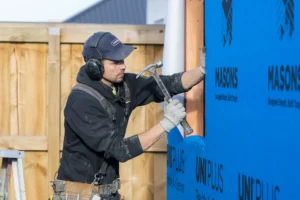
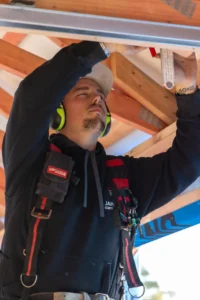
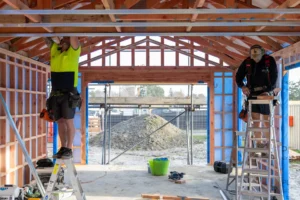
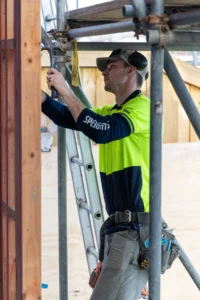

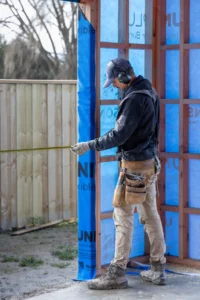

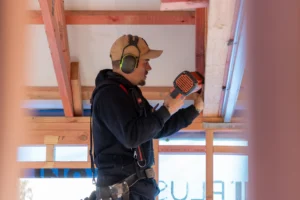
Table of Contents
Average Kitchen Renovation Costs In Christchurch
If you’re planning to upgrade your kitchen in Christchurch, one of the first questions you’ll ask is, “How much will it cost?” Understanding the typical price ranges gives you a clear starting point and helps you set a realistic budget. Whether you’re doing a simple upgrade or a full redesign, the costs can vary based on the materials, layout, and professionals you hire.
Current Kitchen Renovation Price Ranges
Kitchen renovation prices in Christchurch generally fall into three categories: basic, mid-range, and high-end. Each level reflects different choices in design, materials, appliances, and labour.
| Renovation Level | Estimated Cost Range |
| Basic | $15,000 – $25,000 |
| Mid-Range | $25,000 – $45,000 |
| High-End | $45,000 and above |
Basic Kitchen Renovation ($15,000–$25,000)
A basic kitchen renovation in Christchurch typically includes cosmetic improvements. You might keep the same layout, install flat-pack cabinets, choose affordable benchtops (like laminate), and opt for standard appliances. Labour costs stay low if plumbing and electrical work don’t need major changes. This is a common choice for rental property upgrades or budget-conscious homeowners.
Mid-Range Kitchen Renovation ($25,000–$45,000)
This range is popular among Christchurch homeowners aiming for a mix of style and functionality. You can expect semi-custom cabinetry, engineered stone benchtops, upgraded appliances, new lighting, and moderate layout changes. Most mid-range renovations include licensed trades, which adds to the overall reliability and finish quality.
High-End Kitchen Renovation ($45,000+)
High-end kitchen renovations go beyond the basics. These projects often involve a complete redesign of the layout, full custom cabinetry, premium finishes, integrated appliances, stone or composite benchtops, and advanced lighting. You’ll also pay more for experienced interior designers, project managers, and builders. This option is ideal if you’re transforming your kitchen into a long-term showpiece.
What Drives These Prices?
Several key factors influence where your project falls within these ranges:
- Size of the kitchen – Larger spaces require more materials and labour.
- Material choices – Imported tiles or engineered stone cost more than local or standard options.
- Trades involved – The more complex the job, the more you’ll spend on electricians, plumbers, and builders.
- Appliance selection – Budget appliances vs. smart or integrated systems create big price differences.
- Council approvals – Structural changes may require permits, adding cost and time.
Local Data And Experience
Based on quotes gathered from Christchurch renovation companies like Refresh Renovations, Dream Doors, and local independent builders, these price ranges are realistic for 2025. While prices may fluctuate due to material supply or demand for trades, these figures give you a strong base to start planning.
Knowing the average kitchen renovation costs in Christchurch helps you set expectations and avoid budget surprises. Whether you’re going basic or aiming for a custom upgrade, it’s important to get multiple quotes and compare value, not just price. Each home is different, and even a small renovation done right can make a big difference in daily living and resale value.
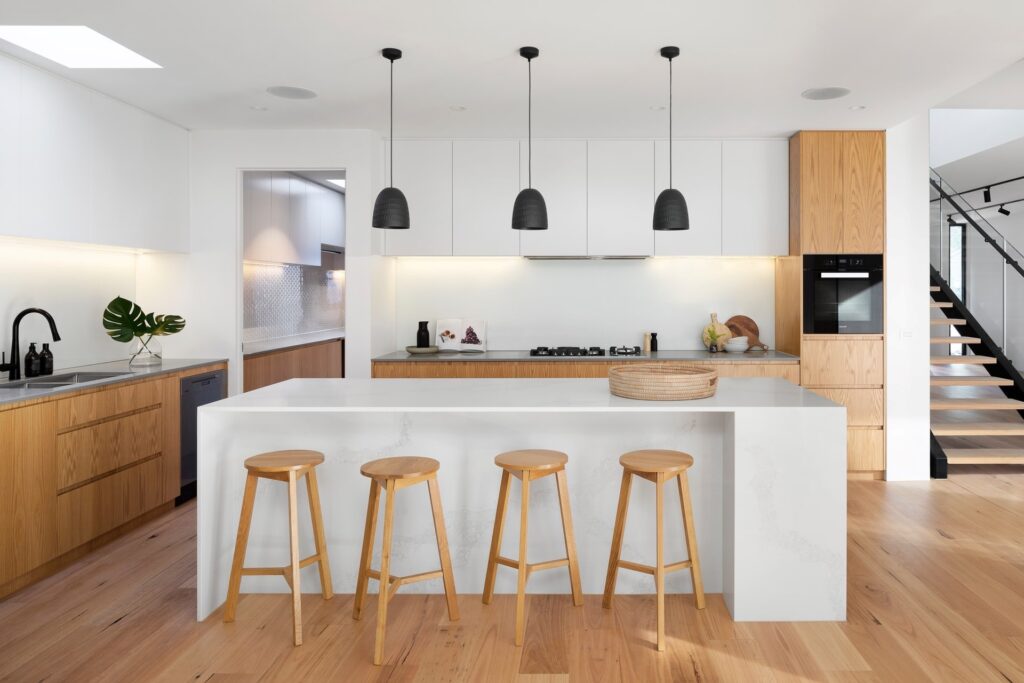
What Impacts The Cost Of A Kitchen Renovation?
The cost of a kitchen renovation in Christchurch isn’t fixed. Several important factors affect how much you’ll end up spending. If you understand these early on, you’ll be in a better position to make smart decisions and stay within your budget. Here’s a breakdown of what can influence your kitchen renovation costs.
Size Of The Kitchen
The size of your kitchen is one of the most obvious cost factors. A larger space typically means more materials, more labour, and more time to complete the job. For example, bigger kitchens need more cabinetry, longer benchtops, and extra flooring. That alone can push the budget up by thousands. On the other hand, a compact kitchen with minimal surface area can keep costs on the lower end.
Layout Changes Vs. Same Layout
Sticking to the existing layout usually saves money. That’s because plumbing, electrical wiring, and walls can stay where they are. If you decide to move the sink, shift the oven, or knock out a wall to open up space, your renovation becomes more complex. Reconfiguring the layout often requires extra trades like plumbers, electricians, or even structural engineers. These changes also take more time, which increases labour costs.
Materials Used (Cabinetry, Flooring, Benchtops)
Material choices have a major impact on your final quote. Basic laminate benchtops and flat-pack cabinets are much cheaper than natural stone or custom joinery. Flooring options also vary in price, vinyl is affordable, while tiles or timber flooring come with a higher price tag. Choosing durable, mid-range materials can strike a good balance between appearance and cost.
Appliance Upgrades
New appliances aren’t always included in the renovation quote, but they’re often needed. Upgrading to modern, energy-efficient models can add anywhere from $3,000 to $10,000, depending on what you choose. Built-in appliances like rangehoods, dishwashers, or wall ovens also require proper installation, which adds to labour costs. If your old appliances still work, reusing them is one way to reduce your expenses.
Plumbing And Electrical Work
Plumbing and electrical upgrades are hidden costs that catch many homeowners off guard. If you’re replacing old pipes, adding outlets, or changing lighting, the work must be handled by licensed trades. In Christchurch, hourly rates for electricians and plumbers can range from $80 to $120. The more complex the job, the higher the bill. Moving a sink or oven will almost always require both plumbing and electrical work.
Permits Or Council Approvals (If Needed)
Not all renovations need council approval, but some do. If you’re making structural changes, altering drainage, or building beyond certain limits, you may need permits. Applying for these involves time and extra fees. You might also need to work with a draughtsperson or architect to prepare plans for approval. Always check Christchurch City Council regulations before starting to avoid unexpected delays and costs.
Final Example To Keep In Mind
Let’s say you’re planning a full kitchen remodel. If you reconfigure the layout, upgrade to stone benchtops, install new appliances, and move the sink, the total cost could jump significantly. This is why even small decisions, like keeping the layout the same, can lead to big savings.
Understanding these cost factors upfront will help you plan your renovation more efficiently and avoid budget blowouts. Think about your priorities, what you can reuse, and where you’re willing to invest. With smart planning, you can get the kitchen you want without overspending.
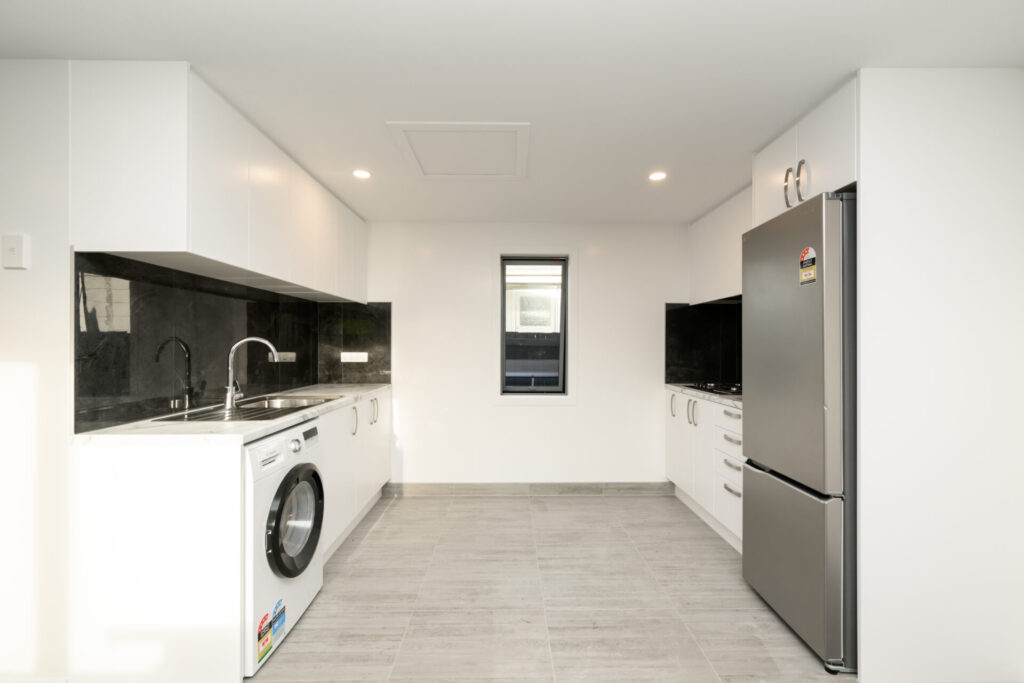
Cost Breakdown By Category
Understanding where your money goes in a kitchen renovation helps you plan better and avoid unnecessary expenses. Here’s a clear breakdown of the main cost categories homeowners in Christchurch should consider. Each element can significantly affect your final renovation budget, depending on the materials you choose and the complexity of the work.
Cabinets & Storage
Cabinets are often one of the most expensive parts of a kitchen renovation. They define your kitchen’s layout, storage, and visual appeal. In Christchurch, you have two main options when it comes to cabinets: flat pack or custom-built.
Flat Pack vs. Custom
Flat pack cabinets are pre-manufactured and sold in standard sizes. They’re more affordable and widely available through retailers. These are ideal for straightforward kitchen layouts. On average, flat pack cabinets can cost between $2,000 and $6,000 depending on the size of your kitchen and the brand you choose.
Custom cabinets, on the other hand, are built specifically for your kitchen’s dimensions and storage needs. They offer better quality and long-term durability but come with a higher price tag. Expect to pay anywhere from $8,000 to $20,000 or more for custom cabinetry.
Local Makers vs. Imported
Choosing locally made cabinets supports Christchurch tradespeople and often results in better communication, faster delivery, and easier after-sales service. Imported options may offer more variety in design or lower initial pricing, but costs can increase with shipping, delays, or warranty issues.
Benchtops
Benchtops affect both the function and appearance of your kitchen. Prices vary based on the material’s quality, durability, and installation requirements.
Laminate, Stone, Engineered Stone – Cost Difference
Laminate is the most budget-friendly option, costing between $200 and $500 per square meter. It’s easy to clean but not heat or scratch-resistant.
Stone benchtops, such as granite or marble, are durable and high-end, with prices ranging from $700 to $1,200 per square meter. They offer a luxury look but can be heavy and require sealing.
Engineered stone (like Caesarstone or Silestone) is a popular middle-ground. It’s made from crushed stone and resin, offering durability and style for $400 to $900 per square meter.
Flooring
Flooring choices affect the room’s style, comfort, and maintenance needs. It’s important to choose a surface that can withstand kitchen traffic, moisture, and spills.
Tiles, Vinyl, Timber – Pros, Cons, Prices
Tiles are durable and moisture-resistant, making them ideal for kitchens. They come in a wide price range, from $30 to $120 per square meter for materials. Labour can add another $40 to $80 per square meter.
Vinyl flooring is budget-friendly, easy to install, and low-maintenance. It costs around $25 to $50 per square meter. While it lacks the premium feel of tiles or timber, modern vinyl options can mimic their appearance quite well.
Timber flooring offers warmth and a natural finish, but requires more care. It typically costs $90 to $150 per square meter, including installation. Engineered timber is a cheaper, more stable option that looks similar but holds up better in moist environments.
Appliances
Appliance costs can vary based on brand, size, and features. Choose based on function, lifestyle, and available space.
Built-In vs. Freestanding
Freestanding appliances like stoves and dishwashers are easier to replace and usually less expensive. Built-in options offer a sleek, seamless look and may improve property value, but come with higher installation costs and limited future flexibility.
A quality freestanding oven may cost around $1,000 to $2,000, while a built-in unit could range from $2,000 to $5,000, depending on the brand and integration complexity.
Energy Efficiency Factor
Energy-efficient appliances may have a higher upfront cost but save money over time on electricity bills. Look for appliances with high Energy Star ratings, especially for fridges, ovens, and dishwashers. In New Zealand, energy-efficient models can reduce annual running costs by hundreds of dollars.
Labour & Trades
Labour is a major part of any renovation budget. The quality of work you receive depends on who you hire and how specialized the tasks are.
Builders, Electricians, Plumbers – Average Christchurch Hourly Rates
Builders typically charge $70 to $100 per hour. They handle framing, cabinetry, and structural work.
Electricians charge around $90 to $130 per hour, depending on experience and certifications. If you’re installing new outlets or upgrading lighting, this will be a necessary cost.
Plumbers in Christchurch usually charge $80 to $120 per hour. Any changes to water lines, sink installations, or new fixtures will require plumbing work.
Some trades charge fixed prices for specific jobs, especially for small, defined tasks like installing a new sink or oven. Be sure to get written quotes and ask for detailed breakdowns to avoid unexpected costs.
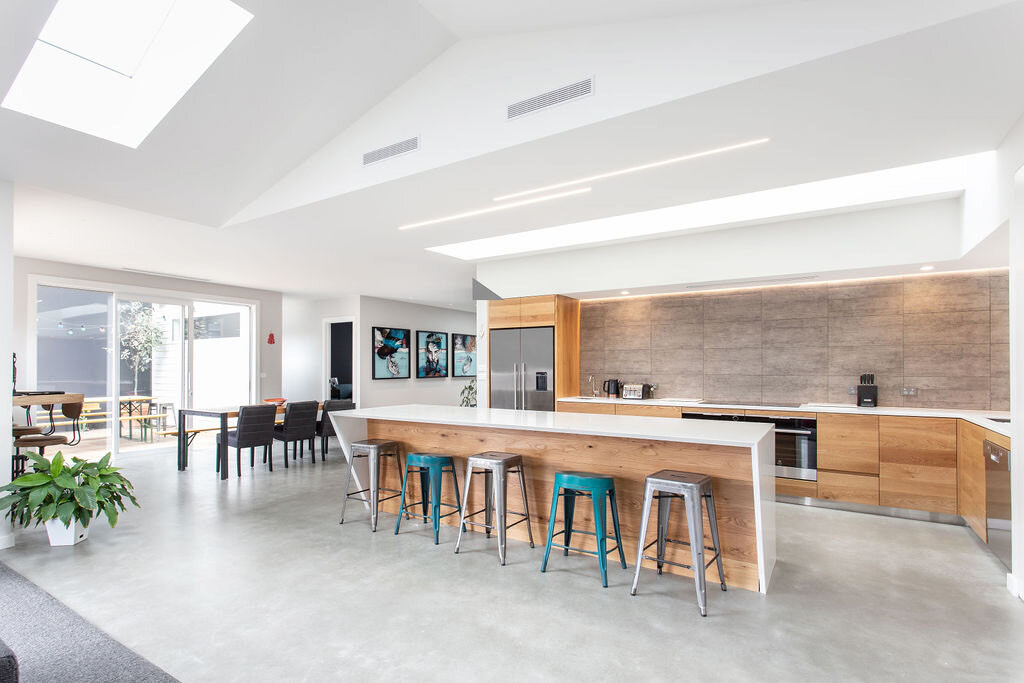
Christchurch-Specific Factors That Affect Pricing
When planning a kitchen renovation in Christchurch, local conditions can significantly impact your total costs. Beyond materials and design choices, certain region-specific elements play a major role in pricing. Understanding these factors helps you set realistic expectations and avoid budget blowouts.
Local Demand And Contractor Availability
Christchurch has experienced steady growth in residential renovation projects, which affects the availability and pricing of skilled tradespeople. When demand is high, especially during peak seasons like spring and summer, contractors can charge more for their services or may have long wait times. If you want to book trusted builders, electricians, or plumbers, it’s wise to plan months in advance. Limited availability can drive up labour costs and delay your renovation timeline. Choosing to renovate during quieter months may give you more competitive pricing and flexible schedules.
Supply Chain Issues Or Seasonal Fluctuations
Material costs in Christchurch can change based on supply chain pressures and seasonal factors. For example, importing stone benchtops, custom cabinetry, or specialty fixtures may take longer or cost more during global shipping delays or local shortages. You might also see a spike in prices when demand surges across the region. Rain and colder weather in winter can affect renovation schedules, especially if exterior access or plumbing work is involved. Planning your project with flexibility in mind helps avoid unexpected expenses tied to delays or urgent resourcing.
Council Fees Or Region-Specific Requirements
Depending on the scope of your renovation, you may need to engage with Christchurch City Council for permits or consents. Any work that alters structural elements, plumbing layout, or electrical wiring may require official approval. These permits come with fees that vary based on the type and size of the work. In some cases, you may also need to meet local compliance rules, such as earthquake strengthening or insulation upgrades. Failing to factor in these regulatory costs can catch homeowners off guard, so it’s important to consult with your builder or architect early in the process to clarify requirements.
By being aware of these Christchurch-specific factors, you can plan your kitchen renovation with a clearer understanding of how local conditions may affect both your timeline and budget. This local insight allows you to prepare for variations in cost and make smarter choices from the start.
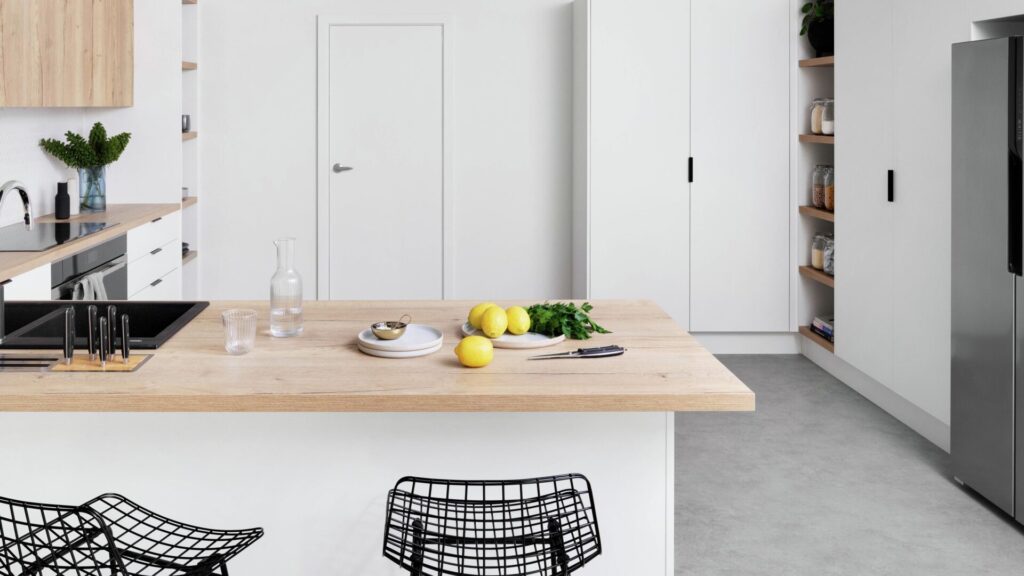
Hidden Or Overlooked Costs To Watch Out For
When budgeting for a kitchen renovation in Christchurch, most homeowners focus on visible expenses, cabinetry, appliances, flooring, and labour. But what often disrupts the budget are the hidden or overlooked costs that show up once the renovation begins. These surprise expenses can add hundreds or even thousands to your total cost if you’re not prepared. Here’s a breakdown of the most common ones to keep in mind.
Demolition And Waste Removal
Before anything new can be installed, the old kitchen needs to come out. This includes removing old cabinets, countertops, flooring, and possibly appliances. While some contractors include demolition in their quotes, many treat it as a separate charge. If you’re removing heavy materials like tiles or concrete, expect higher labour and disposal fees. Christchurch has regulations around waste disposal, and you may need to pay for skip bin hire or transport to a landfill. Costs can range from $500 to $2,000, depending on the kitchen size and volume of debris. Always clarify with your builder whether demolition and waste removal are included in the quote.
Unexpected Repairs (Water Damage, Wiring Issues)
Once the walls and flooring are opened up, you might find damage that wasn’t visible during the initial inspection. Common issues include water leaks, mold behind cabinetry, outdated or unsafe wiring, and rotting subfloors. These problems can’t be ignored and will need immediate repair before continuing with the renovation. In older Christchurch homes, hidden electrical or plumbing issues are especially common. Fixing these could add $1,000 to $5,000 or more to your total cost, depending on the severity. It’s smart to build a 10–20% contingency into your budget to cover these kinds of surprises.
Temporary Kitchen Setup Or Dining Options During Reno
During the renovation, your kitchen may be out of action for several weeks. Many homeowners overlook the cost of setting up a temporary space to cook or eat. You might need to buy a portable cooktop, mini fridge, or even rent a small kitchenette setup. Alternatively, you may rely more on takeout or dine out more often, which quickly adds up. Over four to six weeks, these extra food expenses can range from $300 to $1,000, depending on your household size and habits. If you have children or work from home, not having a functioning kitchen can also affect daily routines and comfort, so it’s important to plan for this phase.
Plan Ahead To Avoid Budget Blowouts
None of these costs are unusual or extreme, they’re just often overlooked. By factoring them in from the start, you can avoid stress and make better decisions during the renovation process. Ask your contractor for a detailed quote that includes demolition and waste removal, inspect your home for potential hidden issues, and plan how your household will function without a kitchen. Preparation is key to a smooth, well-budgeted kitchen renovation in Christchurch.
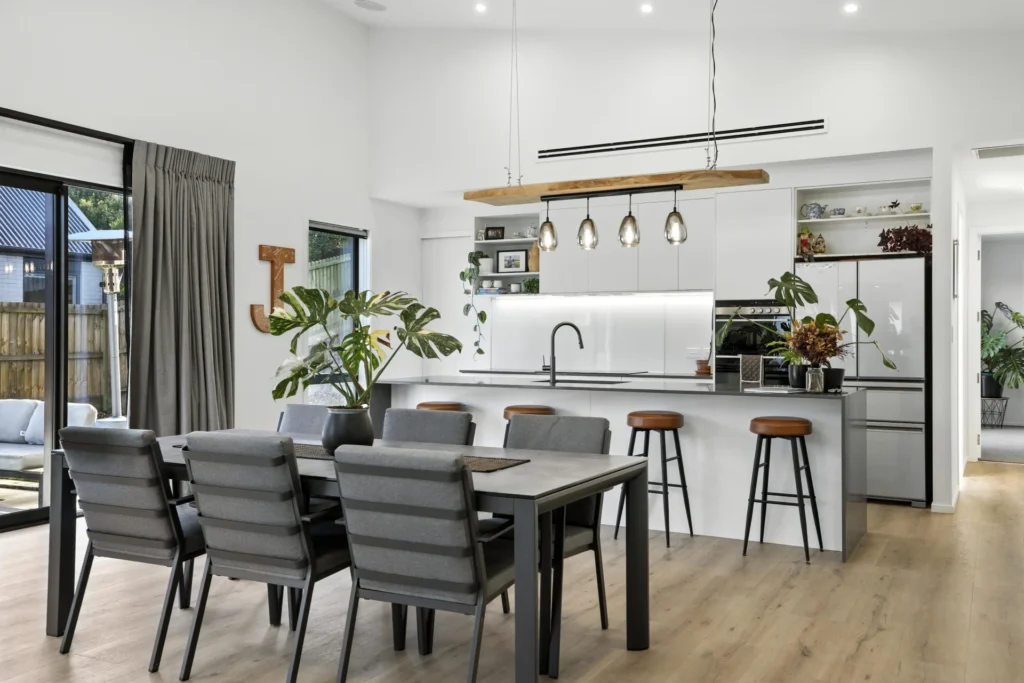
How To Budget For A Kitchen Renovation
Planning a kitchen renovation in Christchurch? Before calling a contractor or choosing a benchtop, you need to start with one critical step: building a solid budget. A clear, realistic budget keeps your project on track, helps prevent overspending, and makes decision-making easier from start to finish.
Start by setting a total budget range based on your financial limits and renovation goals. Are you aiming for a simple upgrade or a full custom kitchen makeover? In Christchurch, basic kitchen renovations can start at around $15,000, while more extensive work can reach $45,000 or more. Knowing your range gives you a framework to decide where to spend and where to save.
Next, always add a 10–20% buffer to your budget. Renovations almost always come with surprises, hidden plumbing issues, electrical upgrades, or material delays. This extra cushion prevents small setbacks from turning into financial stress.
Once your range is set, break it down by category: cabinetry, appliances, flooring, lighting, plumbing, and labour. Then, rank your priorities. Identify what’s essential (functional appliances, safe wiring, reliable flooring) versus what’s nice to have (a waterfall benchtop or custom splashback). If something needs to be cut or postponed, your priority list will guide you.
To keep things organized, use a renovation spreadsheet or a budgeting app. Tools like Google Sheets or home reno apps allow you to track quotes, expenses, and updates in one place. This helps you stay accountable and make better decisions as the project moves forward.
Budgeting for a kitchen renovation isn’t just about numbers, it’s about knowing your limits, planning ahead, and setting yourself up for a smooth renovation experience. When you take the time to budget well, your kitchen upgrade is more likely to finish on time, on budget, and with fewer surprises.
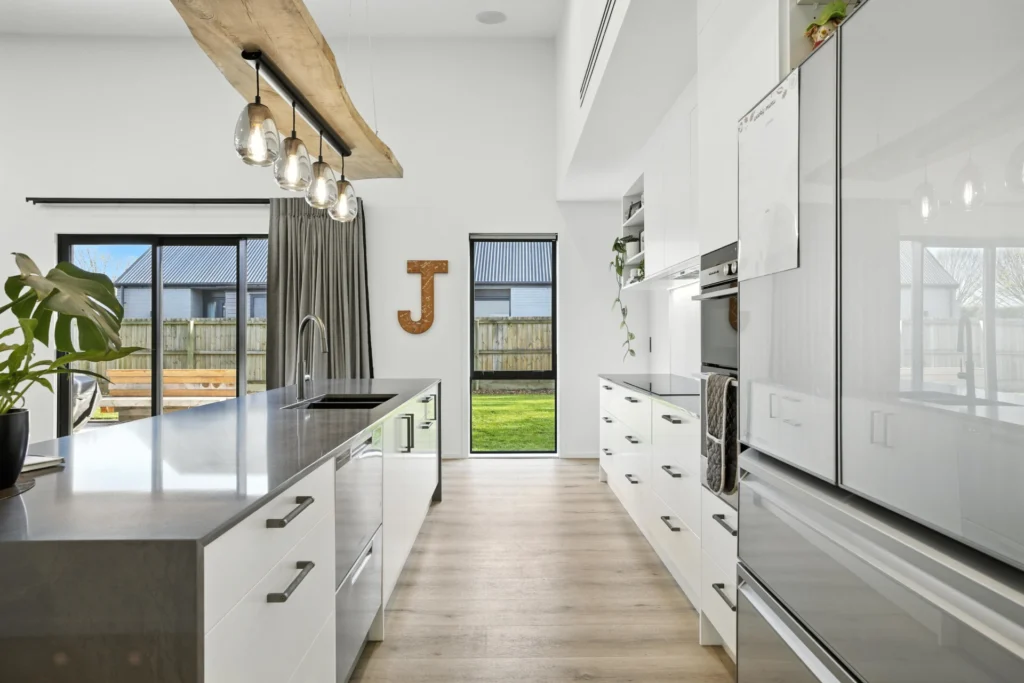
Cost-Saving Tips Without Cutting Corners
Renovating a kitchen in Christchurch doesn’t have to break the bank. With smart planning and practical decisions, you can reduce costs while still achieving a quality result. Here are cost-saving strategies that work without sacrificing durability, style, or function.
- Reuse Existing Cabinetry Or Layout
One of the biggest expenses in a kitchen renovation is custom cabinetry and structural changes. If your current kitchen layout works well, keep it. By maintaining the position of plumbing, electrical, and major appliances, you avoid extra labour costs. Similarly, if your existing cabinets are still in good shape, consider repainting or refacing them instead of replacing everything. New handles, hinges, and a fresh coat of paint can completely update the look without the price tag of new units. - Mix High-End And Budget Materials
Not everything in your kitchen needs to be top-shelf. You can still achieve a premium feel by mixing affordable options with a few standout pieces. For example, opt for laminate benchtops that mimic stone, then invest in a high-quality splashback or premium tapware. This approach allows you to control your budget while still creating visual impact and lasting performance where it matters most. - Get Multiple Quotes From Local Tradies
Prices can vary widely among Christchurch contractors, so don’t settle for the first quote. Reach out to at least three licensed and reviewed tradies. Compare their itemized quotes carefully, looking at labour charges, material allowances, and estimated timelines. Sometimes the cheapest quote isn’t the best, but gathering options gives you leverage to negotiate fair pricing without compromising the quality of work. - Schedule Off-Peak Renovations (Avoid Holiday Rush)
Timing can affect how much you pay. During peak seasons, like November through January, tradies are in high demand and often charge premium rates. Scheduling your renovation during quieter months can help reduce labour costs and improve availability. You may also find discounts on materials and appliances during mid-year or end-of-season sales. Planning ahead gives you the freedom to choose the right people and products without pressure.
Smart kitchen renovation budgeting isn’t about cutting corners. It’s about making informed decisions that stretch your investment further while still delivering a space that looks great and functions well for years to come.
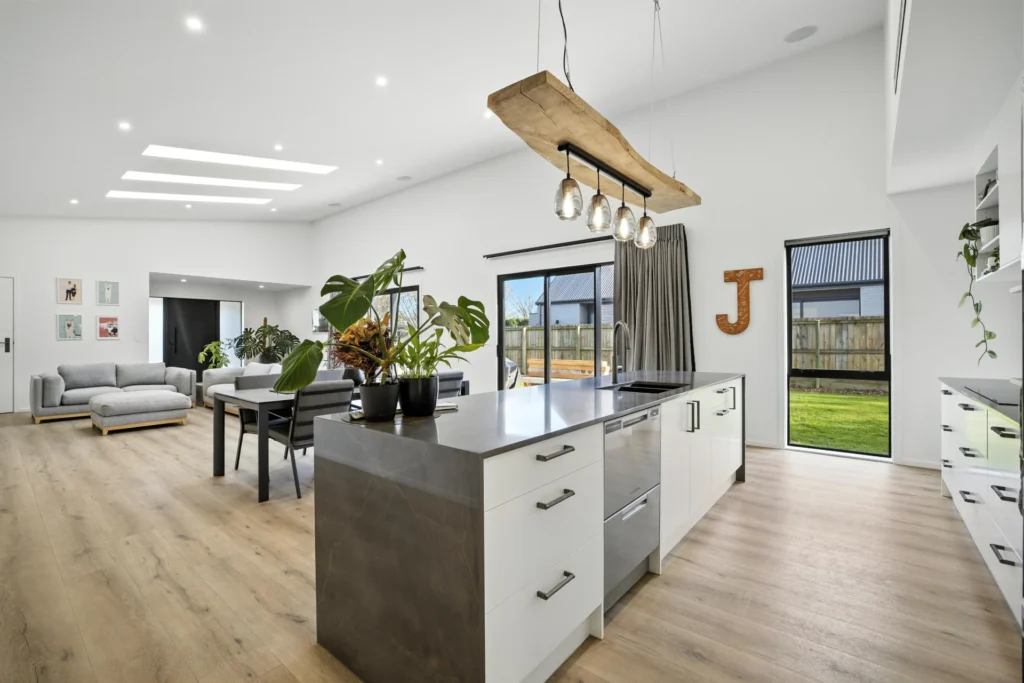
Hiring The Right Professionals In Christchurch
Choosing the right professionals for your kitchen renovation is one of the most important decisions you’ll make. The right team can help you stay on budget, avoid costly delays, and deliver high-quality results that match your vision. Whether you’re working with a builder, designer, or kitchen installer, asking the right questions early on can save you from headaches later.
What To Ask Before Hiring
Start by asking clear, direct questions during your initial conversations. Ask how many kitchen renovations they’ve completed in Christchurch and if they specialize in full remodels or smaller upgrades. Get a clear sense of their timeline, the size of their crew, and whether they handle permits and inspections. Always ask for references from previous clients and follow up with those people. This gives you insight into the quality of work and how well the team communicates throughout the project.
Licenses And Insurance
Never hire a contractor or builder who isn’t licensed and insured. In Christchurch, professional trades must hold current licenses to legally carry out certain types of work, especially electrical and plumbing. Insurance is equally important. It protects you from liability if accidents or property damage occur during the project. Ask to see documentation and verify it before signing anything. A reputable professional won’t hesitate to provide proof.
How To Check Reviews Or Previous Work
Don’t rely only on a few website testimonials. Look up their name or business on Google Reviews, Builderscrack, or local Facebook groups focused on home renovations in Christchurch. Look for consistent feedback on workmanship, timeliness, and communication. A few negative reviews are common, but if you see repeated complaints about delays, budget blowouts, or poor follow-up, take it as a red flag. Also, ask for a portfolio of completed kitchen renovations. Seeing real photos of their work helps you judge their style, attention to detail, and experience with kitchens like yours.
Importance Of Written Quotes And Contracts
Always request a written quote that breaks down every part of the job, materials, labour, appliances, subcontractors, and GST. This transparency helps you understand what you’re paying for and avoid hidden costs later. Once you’re ready to move forward, make sure everything is detailed in a formal contract. It should outline the scope of work, payment schedule, start and end dates, and what happens if something changes. A solid contract protects both you and the contractor.
Ready to plan your dream kitchen in Christchurch? Get expert advice, transparent quotes, and trusted renovation support from local professionals. Visit us to get started








FAQs: About Kitchen Renovation Costs In Christchurch
What is the average cost of a kitchen renovation in Christchurch?
The average kitchen renovation in Christchurch ranges from $15,000 to $45,000+. Basic upgrades start around $15,000, while high-end renovations with custom fittings can go beyond $45,000 depending on materials, labour, and layout changes.
What factors influence kitchen renovation costs the most?
Key cost drivers include the size of your kitchen, the quality of materials, layout changes, appliance upgrades, and the complexity of electrical or plumbing work. Custom cabinetry and premium finishes also increase the total cost.
Can I renovate a kitchen in Christchurch on a $20,000 budget?
Yes, it’s possible to complete a small to mid-range renovation within $20,000 if you keep the existing layout, choose standard materials, and manage labour costs wisely. Getting multiple quotes helps stay within budget.
How long does a kitchen renovation usually take in Christchurch?
A full renovation typically takes 4 to 8 weeks, depending on the scope. Delays can happen due to supply chain issues, custom orders, or council approvals. Always allow for a buffer when planning.
Are building permits required for kitchen renovations in Christchurch?
Not always. If you’re not changing structural elements or plumbing layout, permits may not be needed. For major changes, it’s best to consult with your contractor or Christchurch City Council for guidance.
What are some hidden costs I should prepare for?
Common hidden costs include demolition, waste removal, plumbing upgrades, electrical rewiring, and fixing existing damage behind walls or under flooring. Budgeting a 10–20% contingency is smart.
How can I save money on a kitchen renovation without sacrificing quality?
You can save by reusing cabinets, keeping the current layout, mixing high-end and budget materials, sourcing fixtures locally, and comparing quotes from multiple Christchurch tradespeople.
Should I hire a kitchen designer or manage it myself?
Hiring a designer can help avoid costly mistakes, improve layout efficiency, and save time. If your renovation is simple, managing it yourself could work, but be prepared for more hands-on coordination.
Are kitchen renovation quotes in Christchurch fixed or estimated?
Most quotes are estimates and may change once work begins, especially if unforeseen issues arise. Always ask for a detailed breakdown and clarify what’s included to avoid surprises.
What’s the difference in cost between flat-pack and custom kitchens?
Flat-pack kitchens are more affordable and often range from $5,000 to $15,000. Custom kitchens can cost $25,000 and up due to tailored design, materials, and labour. Custom builds offer more flexibility and durability.
Conclusion
Kitchen renovation costs in Christchurch can vary widely based on factors like the size of your space, the quality of materials, the complexity of your layout, and the tradespeople you hire. While it’s tempting to focus only on the final price tag, taking the time to plan carefully, compare quotes, and research local professionals can save you both money and stress. Smart spending doesn’t mean cutting corners, it means making informed choices about where your budget will have the most impact. Whether you’re upgrading a small kitchen or investing in a complete remodel, having a clear understanding of cost breakdowns helps you stay in control. If you’ve recently renovated your kitchen or are currently planning one, feel free to share your experience or ask questions in the comments—we’d love to hear from you.

